Part 2: Reborn! (Versions 0.06 - 1.0)
The Creation Kit is, at the same time, an extremely useful, powerful, and fairly easy to grasp tool AND a confusing mess that makes one wonder how anyone manages to accomplish anything within its confines. After going through the tutorials (which are actually very well done and very helpful for getting the very basics), I learned three important things that became the combined cornerstone of all of the mods I have made. They are these:
1 – Dialogue trees are easy to make.
I mean, look at this:
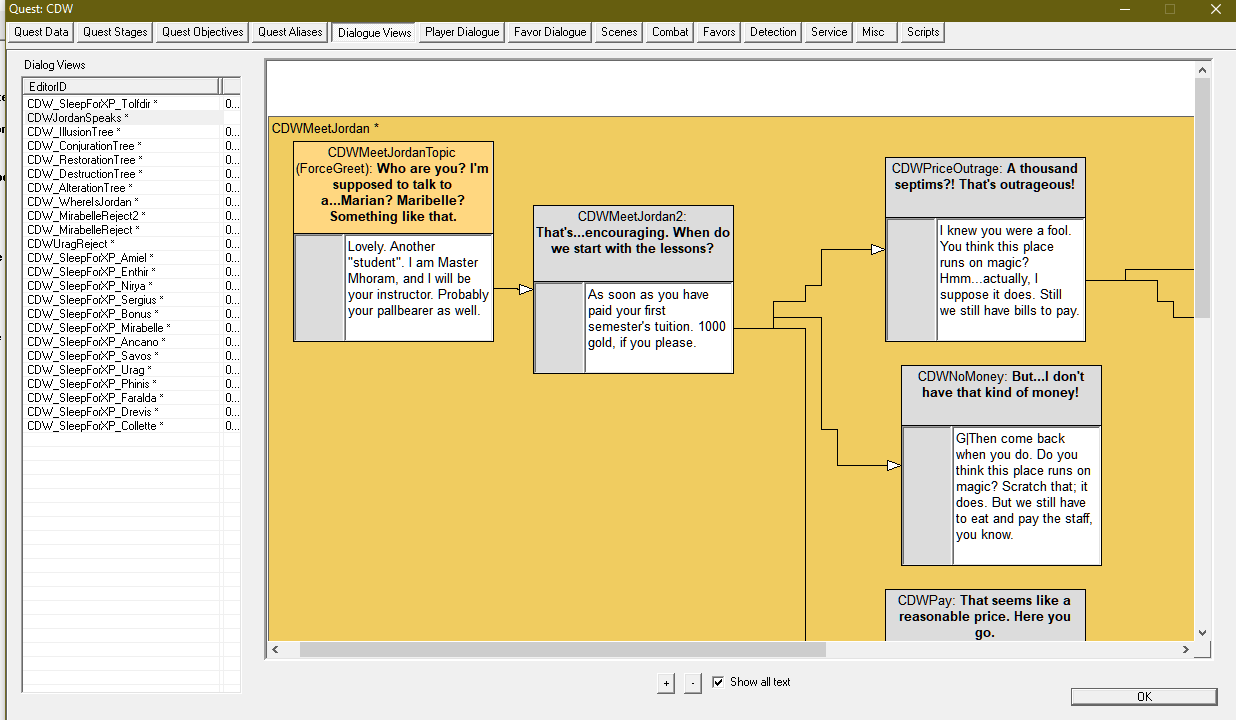
It’s just a flowchart. A flowchart created on a platform that seems to be designed specifically to make it hard to make flowcharts, that is not expandable to an entire screen, and whose boxes stack on top of each other every time you shut down so you have to spend the first ten minutes of your mod-making time untangling them:

But still – just a flowchart.
2 – Quests are easy to make.
Each quest is separated by stages. You start in one, you do whatever is involved in that stage, it moves to the next.
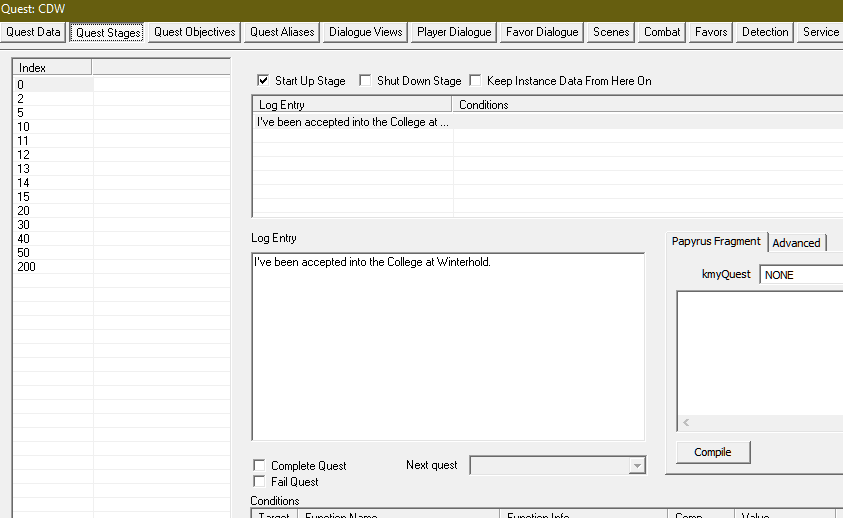
3 – You can incorporate scripts directly into dialogue in order to move quests from one stage to another (or do any other scripting thing).
Most important, the code for these scripts is already written in the tutorials, so you don’t even have to memorize them. Just copy, paste, and change the quest stage to whichever you want it to move to.
There you have it: JFraser’s 1-2-3 method of mod making: Make dialogue, attach a script to the end of the dialogue to move things to the next stage, repeat. Look at any of my mods and you will see this in action. You can’t move from one semester to the next in College Days without talking to Mhoram. You can’t even begin one of the quests in Escape the Cell without talking to someone. Dibella’s markings are put on you via dialogue in Divines Guide You (that’s actually my favorite thing I’ve done via making mods. I think the effect is fantastic). And, of course, you need to speak to the guard outside the cage to begin the auction in Simple Slavery.
Alas, this system failed me when it came to the rest of Simple Slavery. It’s all fine and good to talk to the guard to start the auction but then what? The issue I was having with Simple Slavery that caused me torture to the point where I gave up on it was the auction, which was the heart and soul of the mod. The entire reason for its existence. I could get an NPC to talk, but only to me. The only way I could think to get this entire thing to work would be to prompt the auctioneer to his next phrase by saying something to him every single time, but that would not be even a little immersive. I tried everything I could think of, given what I knew at the time, all to no avail, which was when I hung up my keyboard. So to speak.
To my surprise, the community once again responded with kindness after I announced the death of the mod, thanking me for making the attempt and encouraging me to try smaller things. Maybe I could grow from them and get back to this some day.
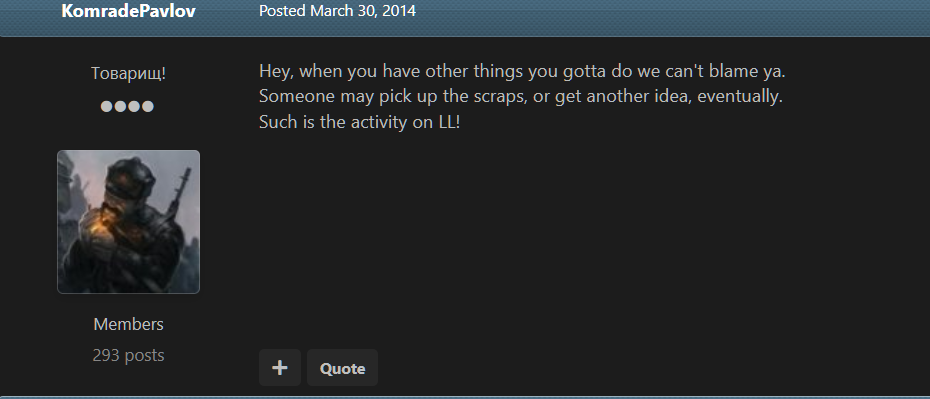


And that is what I did. I started with an idea of a small alternate start mod that would tell a story of a child of a farmer whose home was raided by bandits and you would have to scrape your way to freedom and eventual success. This germ of an idea eventually became Escape the Cell, which was much easier to make because it involved small scenarios that relied almost entirely on dialogue/quest stage scripting.
During the summer and fall of 2014 I worked on EtC and College Days: Winterhold (never did get around to College Days: Bards College, where you become a bard, but I’m thinking about it again) and learned a lot more about making mods and new ways to incorporate slightly more complex scripts.
And then, on October 23rd, I was replying to a post in the SS support thread, where people were tossing out ideas about how the mod could be picked up as a sort of community project, and I had a flash of inspiration.

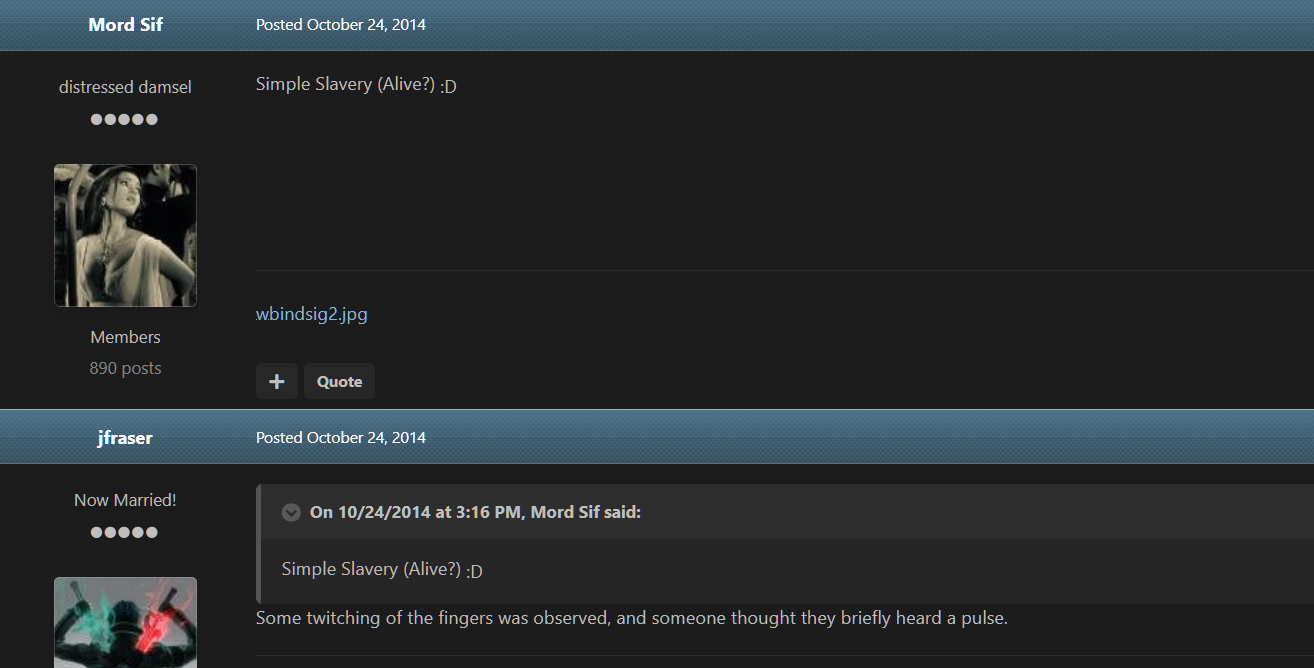
One month later, it became official:

Two things sparked the revival. The first was something so stupidly simple, I’m still kicking myself for not realizing it much sooner: scenes.
The CK has a system to make scenes, where characters talk or move or do other things in a preordained order. I had basically been trying to find a way to make scenes except without the scene function, which was what I found to be impossible.
I knew they existed. Hell, you see scenes play out in the game all the damn time. I even made a scene in Escape the Cell when you overhear slavers talking about you as you are attempting to…well, escape the cell.
But it didn’t connect in my brain that they were the solution to the auction until that moment. Scenes work very much like dialogue and can have scripts connect to them in much the same way. You just have to use aliases instead of the actual characters, for whatever CK reason.
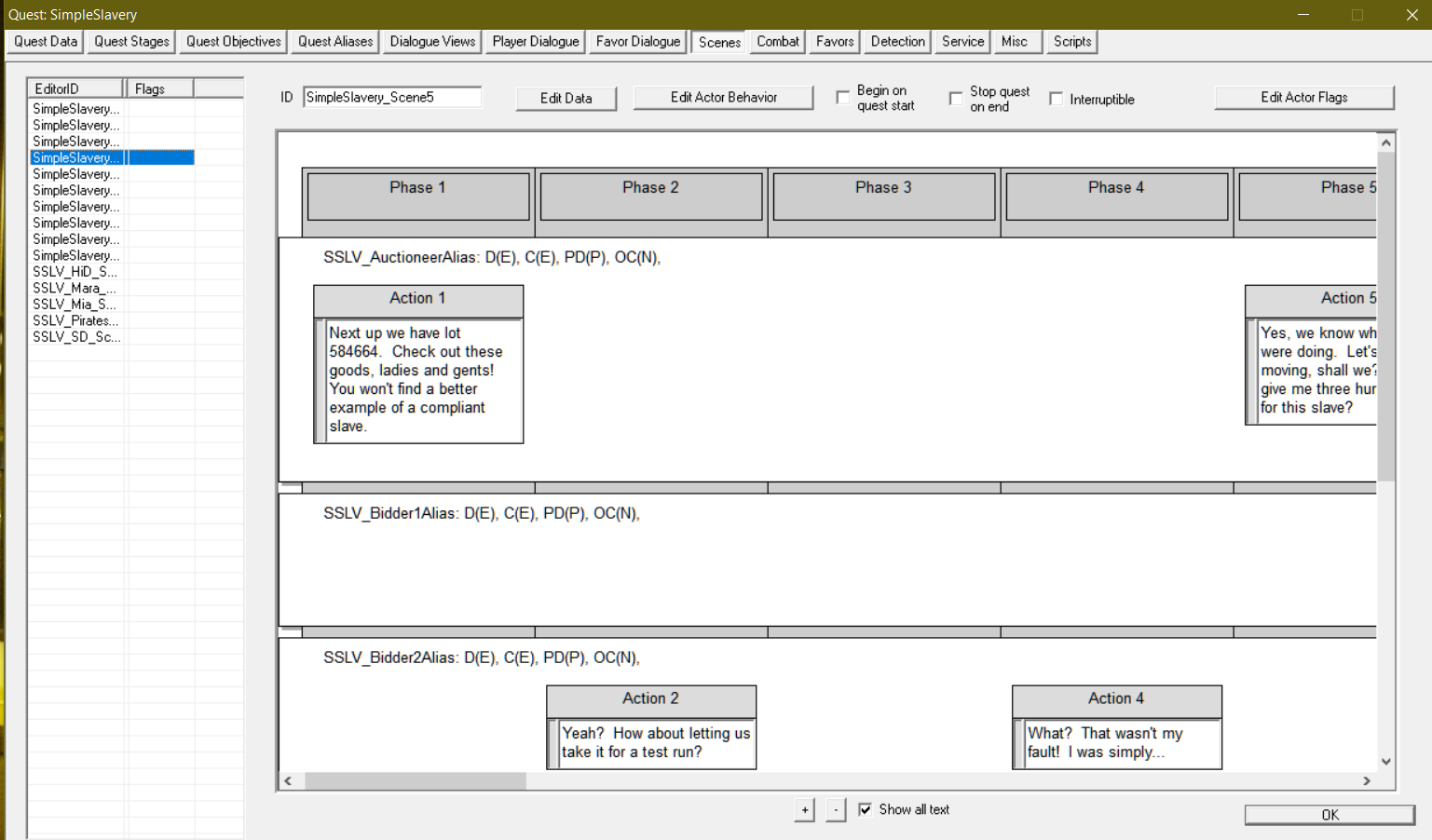
The other game-changer was a mod called Slaves of Tamriel which is still, to this day six years later, the most immersive game playing experience I’ve ever had. . Much like Simple Slavery, it began as a giant multi-tiered concept that became vastly scaled down. In this case, it was because the author (also called @Slaves of Tamriel) wanted to finish one outcome before moving on to the next, but the one outcome kept getting more and more complex. I compare us, but he managed far more with his mod than I ever have. The atmosphere in that mine feels absolutely soul-draining.
SoT changed Simple Slavery on a fundamental level. Here was a mod that already had everything I could have hoped for in a slavery outcome. Well, except a way to end it (which has since been rectified by Slaves of Tamriel plus plus ). But I didn’t know that at the time. I PMd him and we talked about how we might be able to connect the two, which turned out to be as simple as him adding a quest that put the player at the entrance to the mine and me starting that quest at the end of the auction.
Just like that, I had a working mod with an auction and an outcome and a new business model, summed up on December 10, 2014:

This solved all sorts of problems for me. Well, it solved one problem, but it was the biggest problem of them all: my mod-making limitations.
This time around, I recognized those limitations and stuck with simple things that I knew I could do. So, for instance, instead of trying to get someone to drag the player to the auction block, I decided to use blackout-and-moves. Dialogue led to a script that blacked out the screen (a technique that the fantastic @DocClox taught me), a quick MoveTo to a preset X-marker, and, just like that, the player was moved without trying to get the flaky follow function to work.
Using other mods meant that I didn’t have to build complex quests with animations that I could never get to work. If you look deep into SS, you will find my attempts to do so. There is a cell that was meant to be a “pre-auction” room, where the player would be tortured and broken before being sent to the auction. I couldn’t even get the guy to whip me. Later I added another cell that was meant to be a farm where you would be sent as the “default” slave experience instead of being set free. Turns out outdoor world spaces are really hard to make. Neither of these ideas came to fruition because I just couldn’t figure out how to make them work.
So I stuck with what I could do, and that was just enough. The mod was (very very) bare bones, but, at least and at last, its primary purpose had been realized: it was now possible to be auctioned off as a slave to an actual slavery experience.


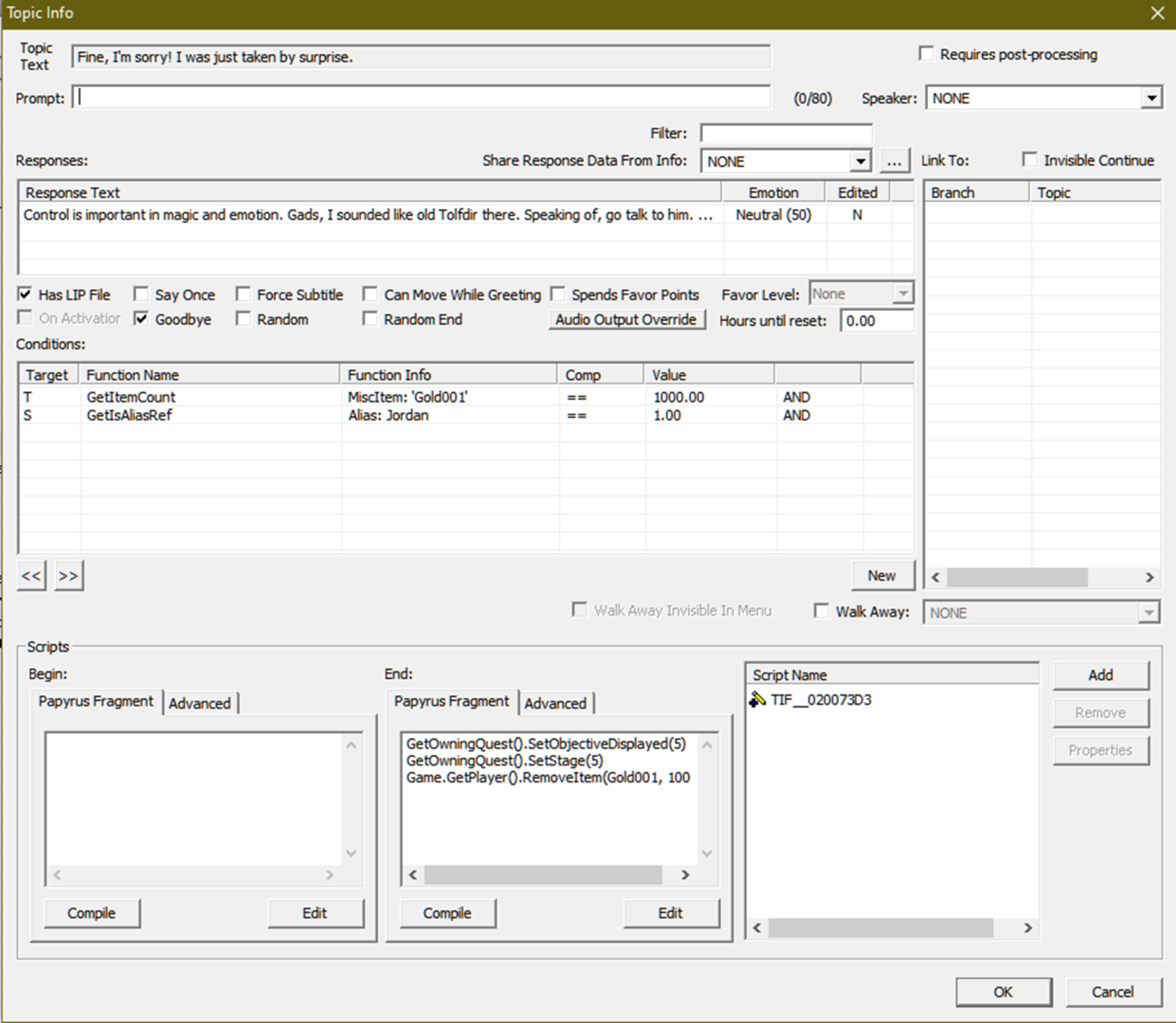
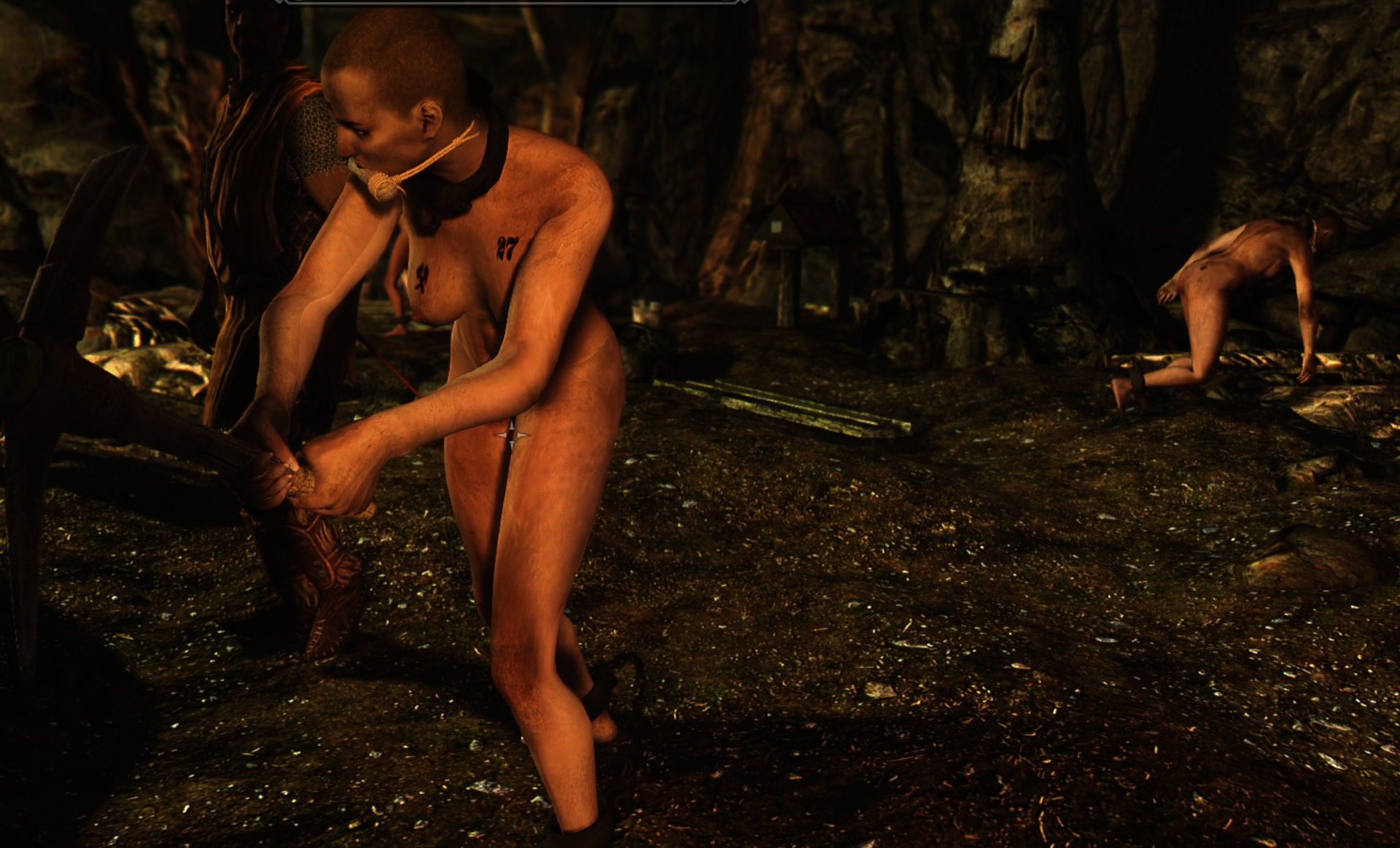
0 Comments
Recommended Comments
There are no comments to display.